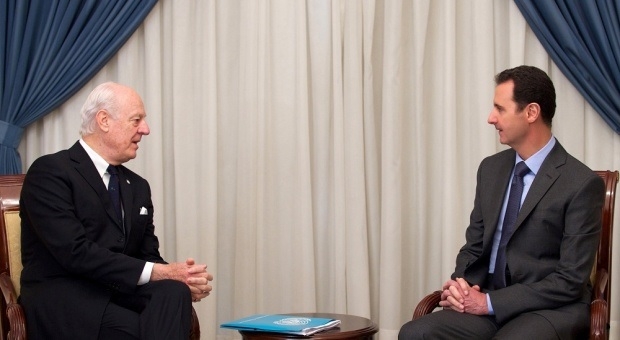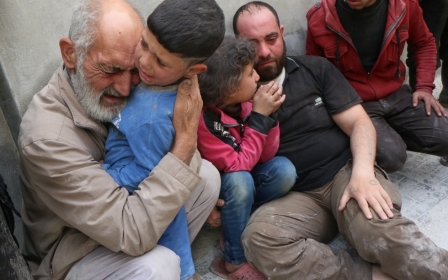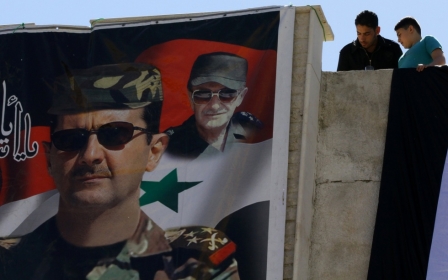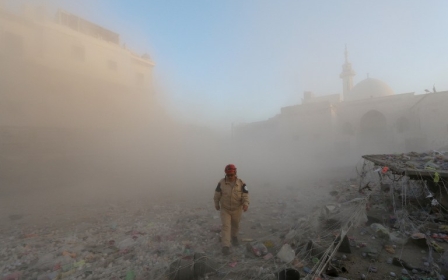Failure or visionary? UN’s Syria envoy speaks out about Aleppo ‘freeze’
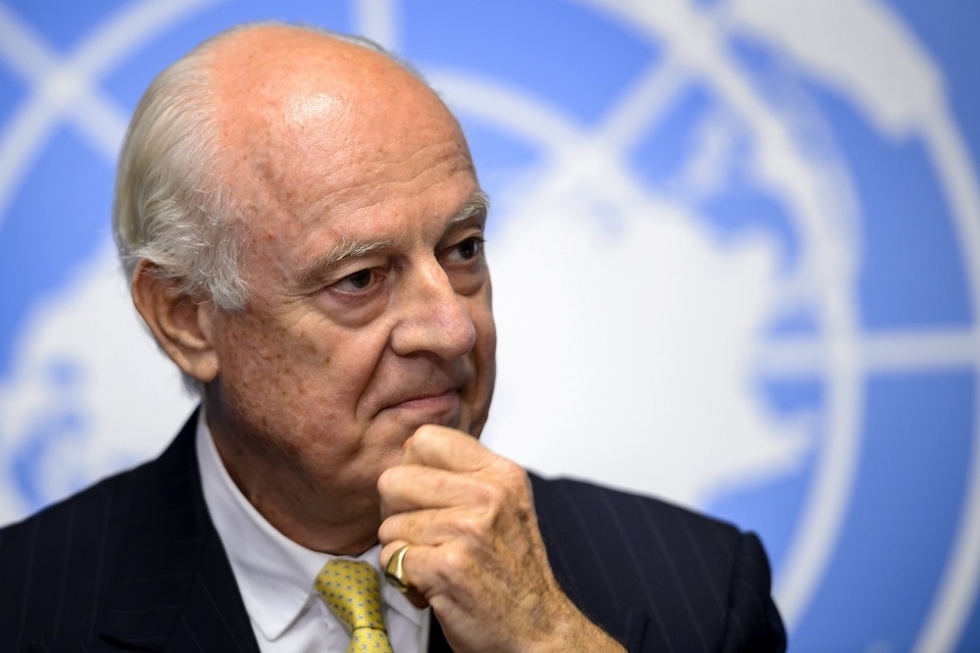
LONDON - When Staffan de Mistura took on the role of UN Special Envoy to Syria last summer, he did so with the knowledge that the post had already felled two giants of international diplomacy.
His predecessor, Lakhdar Brahimi, stepped back from the bloody Syrian stalemate in early 2014 following the failure of the second round of Geneva talks. Recently asked about the West’s response to the Arab Spring, he declared bluntly, "We got it wrong."
Brahimi’s resignation came just a year and a half after former UN chief Kofi Annan conceded defeat in the role, citing a combination of government intransigence, military escalation and a finger-pointing and name-calling culture at the UN.
If these two internationally respected figures couldn’t make an impact, who would take on the mission?
On 10 July 2014 – less than a fortnight after the Islamic State (IS) group declared its "caliphate" – the UN announced that de Mistura, a Swedish-Italian diplomat, was stepping up.
Despite serving the UN in 28 conflict zones including Iraq, Afghanistan, Somalia, Lebanon and Bosnia, de Mistura has continually called himself a “chronic optimist”. That optimism has now been severely tested, with de Mistura increasingly coming under attack for his performance despite a daunting list of challenges.
“I was told by Brahimi and Annan that, ‘if you do nothing, you will be criticised,'” de Mistura told Middle East Eye in a recent interview.
“And if you try to do something, you will have at least one side, or possibly all sides criticising you.”
Rebranding ceasefires
After less than a year in his post, it is de Mistura’s flagship strategy that has been singled out for some of the harshest condemnation of all.
In late 2014, he proposed to introduce a “freeze” in hostilities in Aleppo. If successful in Syria’s largest city, de Mistura argued, there would be “no reason” not to roll out the strategy nationwide. Sceptics began baying straight away.
De Mistura has stayed the course and faced criticism by continuing to outline his rationale.
The term “ceasefire” has too many negative connotations in the Syria conflict, he said, in reference to Homs, where the term came to represent capitulation to the government.
Instead, de Mistura rebranded the concept a “freeze” and said that it could allow humanitarian aid to reach up to a million people.
And the concept of local freezes, he told MEE, had already been promoted by peacekeepers focusing on Syria. Furthermore, local truces had been struck – with varying degrees of success – not only in Homs, but in Barzeh, a neighbourhood northeast of Damascus; in eastern Ghouta, also just outside Damascus; and Ras al-Ain, a town on the Turkish border.
Perhaps most significantly for de Mistura’s argument, there had been a successful mediation around a thermal power station in Aleppo.
In September 2012, opposition fighters – including members of IS, the al-Nusra Front, the al-Tawhid brigade and other brigades – attacked the station. As fighting intensified, the Syrian army responded by closing the power station, which created a blackout across the city and surrounding countryside.
An independent civil society group – the Ahali Aleppo Initiative – then went to the perimeter of the power station to negotiate a deal. Six days later, an agreement was signed, and during the ensuing eight-month siege of the station, the Ahali Aleppo Initiative continued to mediate successfully whenever disagreements arose.
In June 2013, the plant stopped running, reportedly as a result of damage from fighting around it, and Aleppo has found itself in the dark yet again.
The hard truce
As it turned out, it was one thing to negotiate a brief truce at the power station and quite another to propose a truce in the whole city.
Mistura chose Aleppo because he believed various sides in the city had a vested interests in ending their fighting, a key factor according to a 2014 joint report by the London School of Economics and the UK-based Madani organisation. The report outlined factors needed to achieve long-term peace.
But critics argued that de Mistura failed to take into account a booming international trade in war-zone antiquities, a black market in industrial machinery and a thriving culture of kidnapping that meant that economically, no party was motivated to cease hostilities.
“De Mistura picked up on an idea that was fashionable at the time, but wasn’t based on any empirical research," a conflict mediator who spoke on the condition of anonymity told MEE.
Mouin Rabbani, a Dutch-Palestinian Middle East analyst who worked briefly on de Mistura’s team but left in acrimony, has likewise spoken out about the freeze.
"There are substantial differences between the ceasefires that others are proposing and what de Mistura did,” Rabbani said. “Others were proposing to build on what already existed, to go for situations where it was clear that the parties involved would have an interest in pursuing a ceasefire.
“What I think would have made sense would have been to engage various Syrian parties and, for that matter, regional and international allies and sponsors, quite intensively to try to figure out where the interests of the various parties overlap. And then to identify where and how he would produce a ceasefire,” he added.
De Mistura has now hit back.
“I did the research together with my colleagues, and I was advised by many (to the extent that I had some doubts myself) that Aleppo would be the most difficult place to even think to do a freeze,” he told MEE.
“So why did I do it there and not in other places? … First, because Aleppo is Aleppo and to achieve a freeze there would have an impact around the world, in the way that one in Deraa or Eastern Ghouta would not."
“Second, I had indications that Aleppo was almost totally surrounded [by government troops]. So by publicly proposing the freeze, I was planning at least to draw attention on Aleppo - which was close to collapse - in the hope that it would limit the temptation by the government or opposition to open total fire there,” he added.
The polarisation of the war, however, has meant that encouraging one party to negotiate is often seen as a play against another. To compound this, President Bashar al-Assad has been described as disingenuous and is widely distrusted by opposition forces. According to Hassan Hassan, an analyst at the Delma Institute in Abu Dhabi: "The president tells his guests what they want to hear and he never delivers.”
Yet even taking these dynamics into consideration, de Mistura’s handling of the situation has on occasion been found wanting.
Assad as 'part of the solution'
On 13 February, de Mistura made headlines when he told reporters that Assad should be part of the solution.
The announcement came on the same day that the Syrian government deployed a storm of missiles and barrel bombs in the city of Douma near Damascus.
De Mistura insists that he had only meant that Assad should be part of the solution when it came to setting up the Aleppo freeze, and not part of the solution to the Syrian situation as a whole. But the perception of what he said alienated the opposition which, shortly afterwards, rejected de Mistura’s freeze.
“I flew straight from Damascus to Vienna for some brainstorming on how to prepare ourselves for setting up the Aleppo freeze,” de Mistura said. “I was on the plane for four or five hours, and had not been informed about the attack on Douma at the point that I spoke. When a question came up about Assad, I answered while thinking about the reduction in violence in Aleppo."
“Since Assad was the one who was actually in charge of the most egregious sort of violence there, he was unavoidably someone who should be part of the solution in stopping the bombing. I have had to explain many times since that I was talking about him in that context. It is up to the Syrian people to decide whether or not he should be part of the political solution,” he added.
But the damage was done. Even though the US has since endorsed the idea that Assad should be part of the solution, the UK and France have not.
“Putting aside the substance of what he said, his subsequent actions made very clear that he wasn’t even aware he was expressing a political position, because he started flip flopping up and down for the next four days from the moment he made that statement,” said Rabbani.
“Perhaps the biggest irony here is that once he finally managed to convince anyone that he meant something completely different, John Kerry came out and said the same thing.”
On top of this, the UN Special Envoy was also criticised for not exacting further concessions from the government during talks that month. Any hope that there had been some kind of genuine breakthrough when Assad said that he was prepared to cease aerial hostilities across Aleppo for six weeks was muted. Assad’s minimal concession in the end was that one Aleppan district, Salaheddine, would experience a halt in violence if the truce went ahead.
Shortly afterwards, the tables began to turn on Assad and he was forced on the defensive. On 4 March, Syrian rebels attacked the Aleppo government intelligence headquarters with a tunnel bomb.
In response, the government unleashed a torrent of barrel bomb attacks on the city. A month of intensified fighting around Aleppo ensued. On 9 April, UN Secretary General Ban-Ki Moon gave the clearest acknowledgement that the plan for the freeze had failed, publicly asking de Mistura to re-launch the political process.
Last month, de Mistura announced his latest strategy - briefing the Security Council that he would start talks with Syria’s government, opposition groups and regional powers on 4 May. De Mistura now hopes that by the end of June, his team will have evaluated the chances of ending the war, but even this “chronic optimist” admitted those chances are slim.
Foreign meddling?
One Syria analyst, who admires de Mistura personally but requested to stay anonymous, expressed concern that his main mistake was bringing in the international community far too early rather than first building a level of consensus between Syria’s internal factions.
His emphasis on Iran’s participation in negotiations has caused controversy. The country has been excluded from two previous international conferences on the conflict. While Syria watchers agree Iran should eventually be involved in any political solution, most believe that before including Iran, de Mistura needs to build a stronger connection with the rebels.
He does not seem to give the criticism too much weight.
“I’m talking and relating to everyone,” de Mistura said. “At the UN, you can’t be biased. But I think the only way with this conflict is to be open with every counterpart.”
De Mistura’s predecessor Brahimi has recently argued that even Moscow must be part of the solution. This is despite the fact that the close Assad ally has repeatedly vetoed UN Security Council resolutions aimed at taking punitive action against Assad.
De Mistura agrees with Brahimi on this uncomfortable point, saying: "Certainly there is no doubt that Russia is very knowledgeable on Syria. Their relationship goes back to the presidency of Hafez al Assad - therefore they do have a knowledge of the system and the way the Syrians actually think."
He continued: “We cannot accept that this conflict is routine. We must try anything we can to break it.”
Whatever the merit of this view, De Mistura admits that he still has much to prove.
Some have argued that recent events on the ground, which have seen government troops pushed back on several fronts, could finally provide a window for change.
In order to profit from any shift, however, de Mistura said he knows he will have to demonstrate quickly that he has learned from his mistakes. Despite the pressures, his chronic optimism remains in evidence as he quotes the playwright Samuel Beckett. “Ever tried. Ever failed. No matter. Try again. Fail better.”
New MEE newsletter: Jerusalem Dispatch
Sign up to get the latest insights and analysis on Israel-Palestine, alongside Turkey Unpacked and other MEE newsletters
Middle East Eye delivers independent and unrivalled coverage and analysis of the Middle East, North Africa and beyond. To learn more about republishing this content and the associated fees, please fill out this form. More about MEE can be found here.


